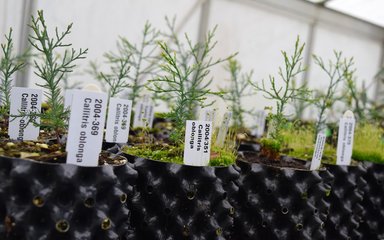Since 2020, Bedgebury has been working in partnership with Inala Jurassic Garden in Tasmania, Australia, to grow a collection of Widdringtonia whytei – the national tree of Malawi, and sadly the first tree to be classified as commercially extinct in Africa. After some transit challenges, the first seed arrived in Tasmania from Bedgebury in July 2023, ready to be planted when the conditions are right.
A tree at risk
Widdringtonia whytei, also known as the Mulanje Cedar, is the national tree of Malawi. Since becoming commercially extinct in Africa it has been elevated to listed status by the Convention on International Trade in Endangered Species of Wild Fauna and Flora (CITES).
In the past, Bedgebury has offered advice to tree nurseries in Malawi about how to re-grow the tree in Malawi. Back in the UK we were also able to host local schools to teach students about the project and tree conservation.
Conservation work in Australia
In 2020 we started working in partnership with Inala Jurassic Garden in Tasmania, Australia, as part of a Botanic Garden Conservation International (BGCI) / ArbNet grant to grow an ex-situ collection of Widdringtonia whytei from seed in the safe environment of Tasmania’s Bruny Island.
The team there have experience growing the other three Widdringtonia species and the island has an ideal climate. We would be unable to grow the tree outside in the UK because of the colder conditions.
Inala’s aim is to grow the trees and be able to distribute seedlings to other gardens in Australia with a suitable climate, and to grow specimens to reproductive age and harvest the seed for further distribution in Australia and hopefully eventually back to Malawi too. Bedgebury's involvement with Inala has been to share seed and offer propagation advice.
Overcoming international transit challenges
Sending CITES listed seed to Australia has not been without its challenges. The first hurdle was to go through the formidable process of listing the species with Biosecurity Australia and obtaining their approval to import the seed. We were then required to find an international courier service who would ship the seed and handle the customs aspect of the delivery.
A phytosanitary certificate, which details plant health, was required from the UK Animal and Plant Health Agency (APHA) and the seed needed to be sterilised before sending to comply with Australian legislation. Both a UK-issued re-export CITES permit and an Australian-issued CITES permit were also required, along with various other export and import documentation.
After three weeks in transit and delays at UK Border Security, Australian customs and Biosecurity Tasmania (which required another level of documentation), the seed was successfully delivered to Inala in mid July 2023. They have now cold stratified (refrigerated) the seed to sow in the Southern Hemisphere spring (UK autumn), which will maximise the success of germination.



